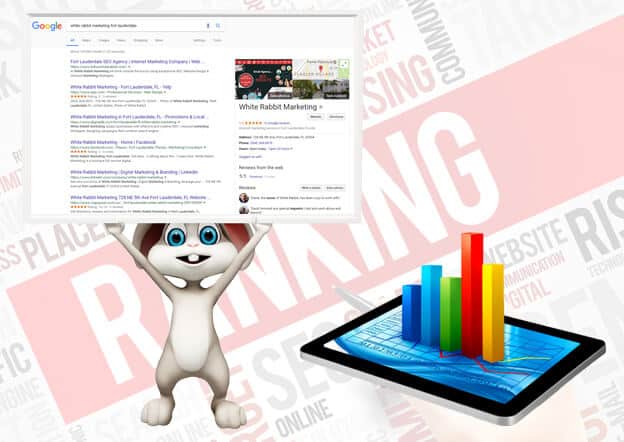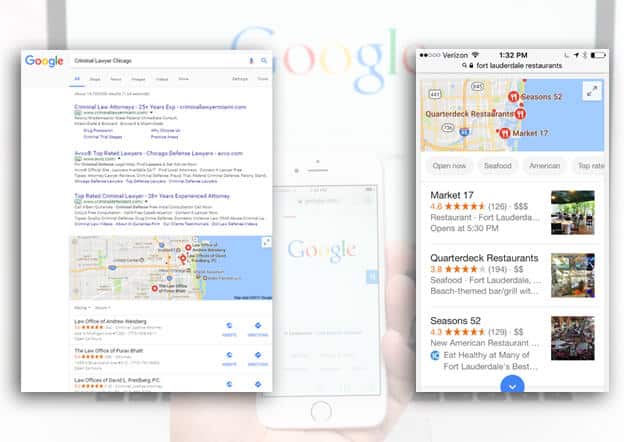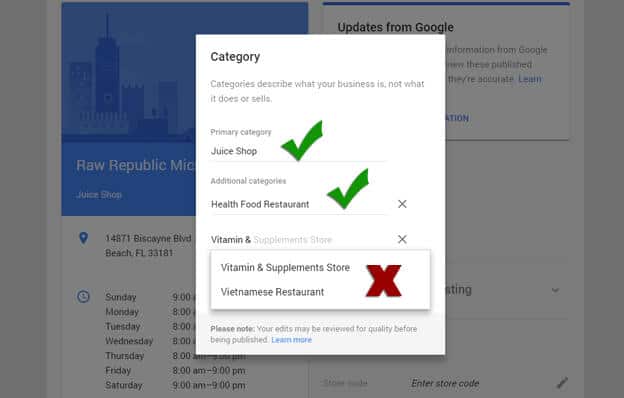
If you have a business with a physical address – or want an audience in a specific geographic area – you may already know how important it is to ensure locals can find you in their search results.
When someone is seeking out a lawyer, therapist, lawn company, restaurant, and so on, chances are good they’re not going to want a business two states over – or even two cities over. They want to search locally. In fact, Google and other search engines automatically preference nearby businesses even when people don’t use a local modifier, such as a city name or the terms “near me.”
Bottom line: you need to show up near the top of the results when someone in your area searches for your type of business or you’ll lose out on sales.
Most likely, you’re already trying to rank for local searches. Maybe you include local-focused keywords in your website content or list your business on directory sites.
Have you ever wondered which strategies are really the best ones though? Which ones other businesses use with positive results?
Well, now you can find out! Recently, Moz released the results of its 2017 Local Search Ranking Factors survey. They go into their findings in great, exhausting detail in a few different posts. If you’re interested, you should absolutely head over there and take a look.
In the interest of time though, I will look closer at three specific parts of the survey. This provides a nice overview about which local search ranking factors businesses should really focus on:
- Local Pack/Finder Ranking Factors
- Localized Organic Ranking Factors
- Foundational Factors and Competitive Difference-Makers
By using the results of these three key areas to inform your local strategy, you can streamline your efforts and get a better return on your marketing investment.
Local Pack/Finder Ranking Factors
Before I dive into the factors, let me explain this area a bit: what is the local pack/finder?
Basically, it’s that “pack” of three results grouped together with a map that often shows up when you do a Google Search. Here are a couple of examples from desktop and mobile search:

Depending on the type of business you search for, these results can look a bit different and may not always appear right at the top, but they are almost always there. The Finder is a complete list of results that comes up when you click “More Places” under the blue arrow at the bottom of that three-pack.
What ranking factors do businesses say matter in helping you to appear in a pack when someone searches for your type of business in your area? In order of importance:
- Google My Business Signals.According to the survey results, businesses have found that they rank higher in searches when they are in closer physical proximity to the searcher (based on the address you give), when they choose categories for their business that seem to align with the search, and when they have the search term in the title of their business. These signals seem to be incredibly important, with respondents saying they make up nearly a fifth of the equation that goes into choosing the businesses that appear in the pack.
- Link Signals.The importance of inbound links just keeps growing, with respondents saying it currently accounts for 17% of the pack equation. The more inbound links you have, the better, but domain authority matters too. A few bigger sites may end up carrying more weight than lots of links from little-known places. Additionally, how those sites are linking to you matters as well – if you can, try to get sites to use anchor text that will benefit you.
- On-Page Signals.
Is your site optimized with local signals like your name, address, and phone (NAP) – preferably on multiple pages? Do you include keywords in page titles that refer both to your type of business and your area? Is your domain authority strong? These things make up about 14% of the pack equation.
- Citation Signals.Citations don’t matter quite as much as they used to, but they are still very important (13%). The factors that seemed to most influence this signal were having a high volume of citations and consistency across citations on NAP.
- Review Signals.You probably know that having good reviews online matters, but the Moz survey breaks it down further. Beyond good reviews, quantity, diversity, and even velocity are important. Yes, that’s right: how fast people are reviewing you matters. These signals equal citations in importance (13%).

- Behavioral Signals.Do people check in at your business? Are they clicking your phone number to call you on their mobile phones? Do you have a high click-through rate? These things make up 10% of your “grade.”
- Personalization.Google collects a lot of information about what every single user does, and they are getting better and better at using someone’s past behaviors to guess at the types of results they are likely to want.Right now, personalization is just as important as behavioral signals, but it’s likely to increase going forward.
- Social Signals.Are people friending you, liking your posts, sharing them, following you? These signals don’t matter quite as much as others (4%), but according to respondents, Google definitely seems to be paying attention to how much engagement you have on social media.
Localized Organic Ranking Factors
This factor is simple to explain. When someone types in a search, local organic ranking refers to where you show up in the regular text list of results we’re accustomed to seeing when using Google search.
Every single one of these signals is the same as the ones for the “pack.” The only difference is that they rank differently. Here is the weight given to each signal by percentage and where they differ in rank from the “pack” results.
- Link Signals.This factor is number two for pack results, but the number one factor for local organic ranking at a whopping 29% – which is almost double the weight given for pack results.
- On-Page Signals.24% here versus only 14% for the pack.
- Behavioral Signals.11%. A few interesting things here: First, behavioral signals are surprisingly ranked above both reviews and citations. Second, though behavioral signals are ranked sixth on the pack list, there is only a single percentage point of difference – 11 to 10%. Clearly, organic local search is far more top-heavy in terms of what matters. Start focusing a lot on your inbound links and on-page signals!

- Personalization.Only 9%, but more important than half of all the signals. The user history of behavior matters significantly more for organic local search.
- Citation Signals.8%. Citations only make up 13% of the pack equation, but this still feels like a pretty significant drop from pack to organic.
- My Business Signals.7%. My Business signals don’t matter all that much for organic local, but don’t discount them. Remember, they are (not surprisingly) the number one signal in terms of what influences your ability to get into one of Google’s packs – something that can gain you a whole lot of visibility.
- Review Signals.7%. This is surprising given how much attention people say they pay to reviews. Based on that, it is likely to rise in coming years – pack results already give review signals significantly more weight.
- Social Signals.4%. Bottom of the barrel on both lists. Still, it would be wise not to discount the importance of social marketing in terms of how it can impact other signals here, including links, reviews, behaviors, and more.
Foundational Factors and Competitive Difference-Makers
With all these different signals, factors, and ways to help (or hurt) your local search rank, you’re probably wondering: is there any way to make this simpler?
Yes, there is!
You can break these factors into two main lists. The first list is the most important factors, which are considered foundational factors. These are the things to focus on first.
Once you’ve mastered them, you can move onto the second list. These factors can help to lift you over your competition – competitive difference-makers.
First, let’s look at the foundational list:
Proper My Business Category Associations.

If your business isn’t listed in the correct category or categories, Google won’t know to include it when people search for what you offer.
Before doing anything else, head into Google My Business. Ensure you defined your business correctly by selecting the appropriate categories.
Primary and Tier 1 Citation Consistency.
Not long ago, there was a huge push for businesses to get listed on as many citation sites as possible. People were putting their company information on hundreds of listings – thousands. Then, if the information changed, or was entered incorrectly the first time, they were told that they needed to spend time going back in and fixing it for every single citation.
Thankfully, there are signs from Google that this isn’t necessary anymore. If you have incorrect information on citation sites, you should absolutely work to correct it. But as long as you ensure that information matches and is accurate on the biggest, most important citation sites, you don’t need to worry about fixing every single one of the smaller listings.
Physical Address in City of Search.
Hopefully this one is obvious. In order for your business to show up in local results, you need to have a physical address in the city where people are searching. Not much to do here other than include that address in listings and on your site.
Point of Search Proximity.
Essentially, how close you are to someone at the moment they are searching. This is actually becoming more important than having a physical address in the city of the searcher, which is both good and bad.
If someone is looking for a restaurant, for example, there’s a good chance they want something close by because they’re hungry. However, if you’re choosing a plumber, lawyer, or doctor, quality is likely going to matter more than a few extra miles.
All you can really do to influence this factor is the same as for the last one – list your physical address.
To sum up the foundational things you need to do:
- Optimizing your business listing – including your NAP, choosing the right categories, title, images, and so on, and ensuring all information is accurate
- Getting on the most important general and industry-specific citation sites
That’s your baseline – what you must do before you can even hope to rank locally.
Now let’s take a look at the competitive difference-maker list:
Quality of Inbound Links.

As mentioned above, links are becoming increasingly important. Want to give your business a nice rankings boost? Work on getting links to your domain from sites that have a high domain authority.
Quantity of Industry-Relevant Inbound Links to Your Domain.
Having bigger, more popular sites link to you is valuable, but it’s also helpful if sites relevant to your industry are sending people your way.
Quality of Links to Your Google My Business Landing Page.
Google puts significant weight on getting high-quality links to your Google My Business listing URL.
Quantity of Links to Your Site from Locally Relevant Domains.
How do you show that you matter in your geographic area? By getting local sites to link to you. The more the better. Higher-quality local sites give you an even greater boost.
For example, a link from your local newspaper would most likely be worth more than a link from a local blogger with a smaller audience.
Quantity of Google Reviews.
This is why you should be encouraging people to write reviews. The more you have, the better your ranking is likely to be. Just remember, people need to actually write something (not just give you a certain number of stars), and the reviews themselves should be positive, so seek out people who have had good experiences.
Notice a trend here with the difference-makers? There are two trends really.
Firstly, 4 out of the 5 difference-maker factors focus on getting more inbound links to your domain. Links matter. Good links matter. Industry links matter. Local links matter.
Second, you should be focusing on a combination of quality and quantity for links and reviews. Probably not exactly a revelation for many people, but it is good to see it confirmed.
So the summation for boosting your local search rank? Seek out more high-quality inbound links and encourage positive reviews.
Obviously this is just the tip of the iceberg. The specific things that matter for you will depend on your area and your particular type of business. If you really want to come up with a comprehensive local marketing plan, the best thing to do is sit down with the experts and look at your unique situation.






 Everything You Need to Know About Mobile SEO for 2017 & 2018
Everything You Need to Know About Mobile SEO for 2017 & 2018 Want 2017 SEO Success Factors at a Glance? Check Out This “Periodic Table”
Want 2017 SEO Success Factors at a Glance? Check Out This “Periodic Table” What Every Attorney Needs to Know about Citation Building for SEO
What Every Attorney Needs to Know about Citation Building for SEO Your Guide to Better Local SEO Results
Your Guide to Better Local SEO Results The Starter Guide to Technical SEO
The Starter Guide to Technical SEO